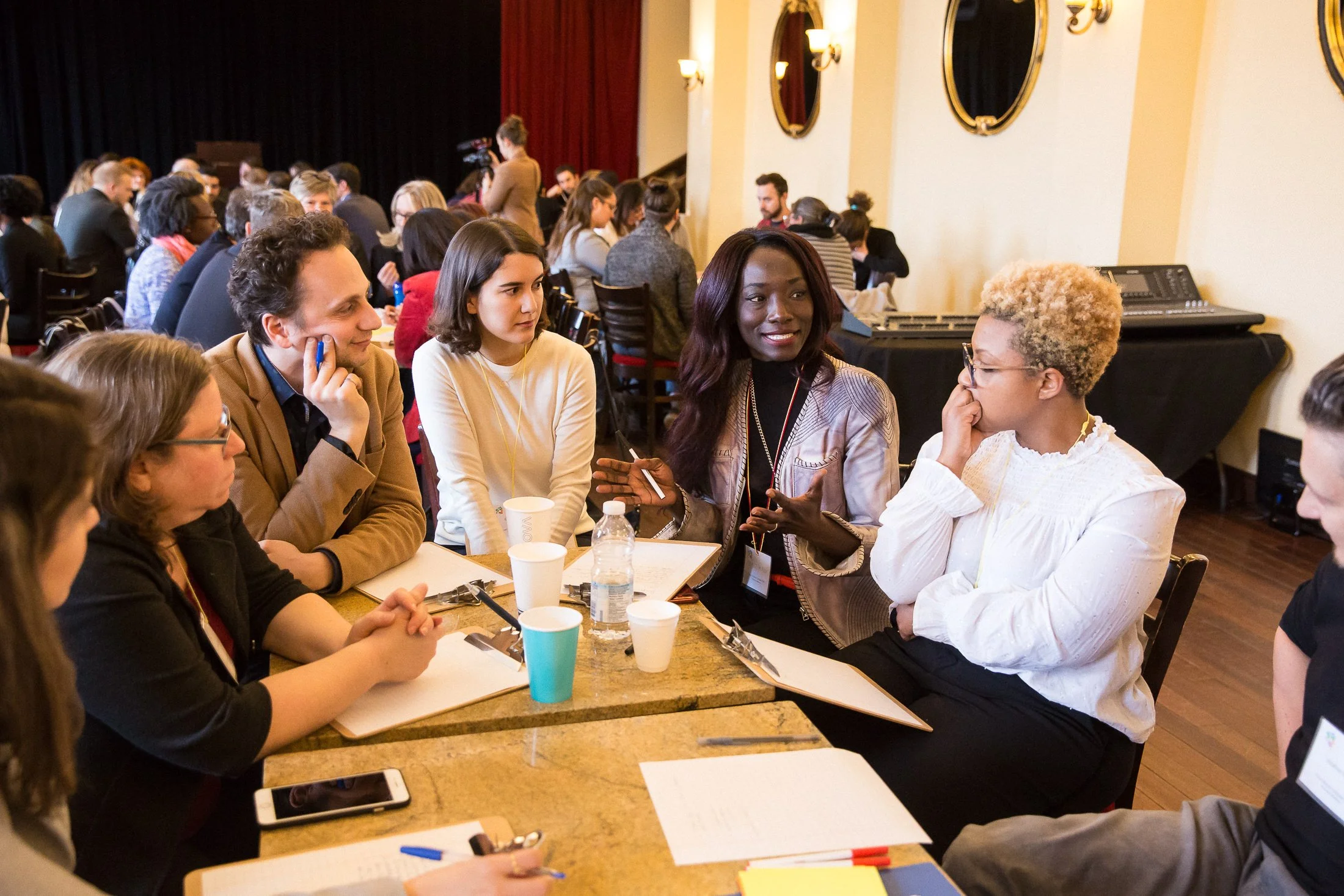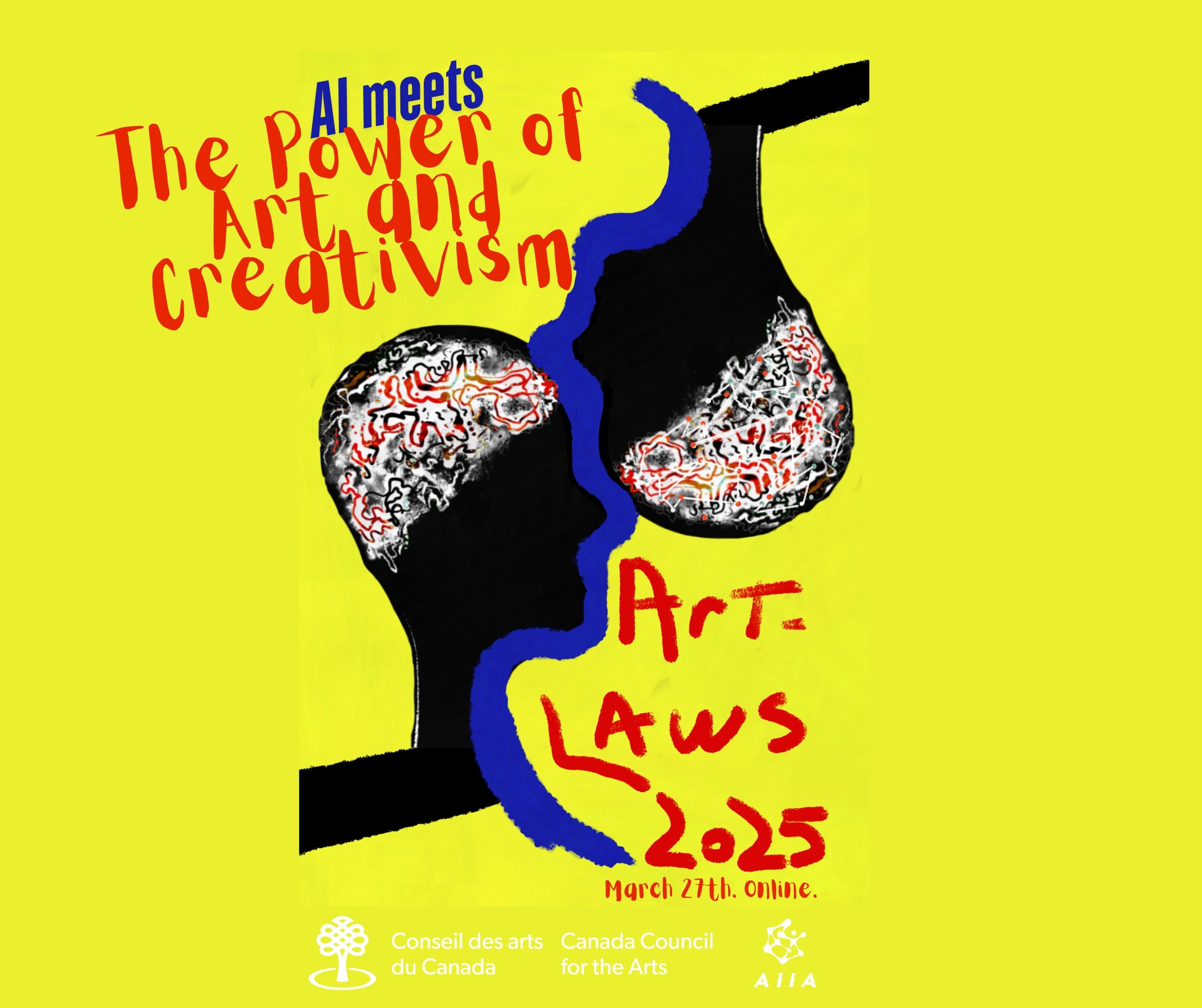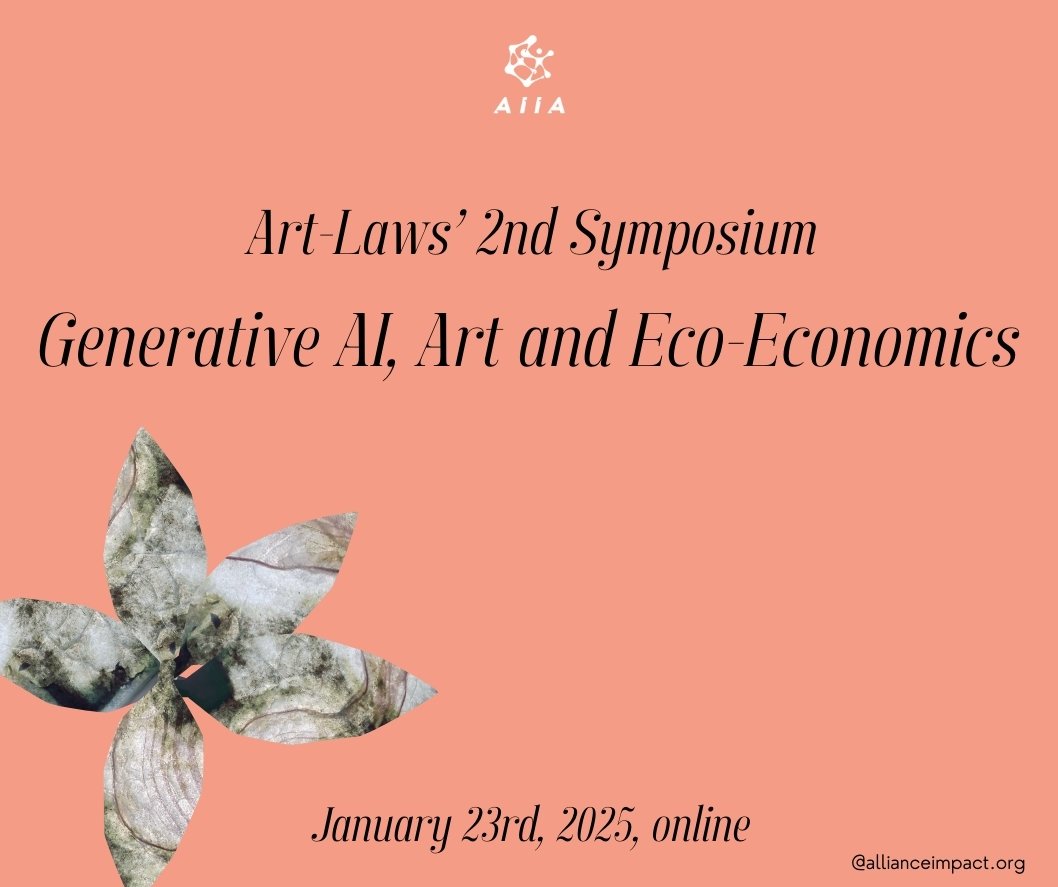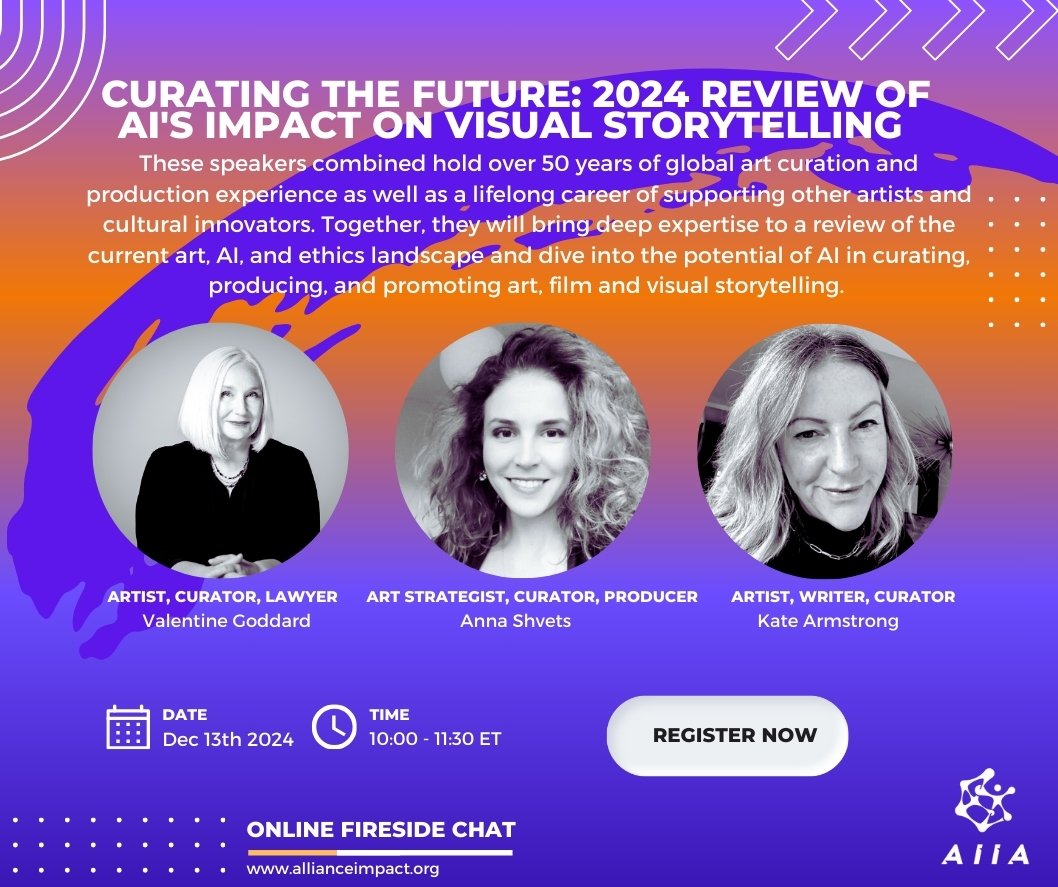
Events
A global having multidisciplinary conversations about AI’s social impact. A space for open, critical yet constructive exchange of perspectives on AI.

Art-Laws 2025 Exhibit & Insights: AI Meets Art and Creativism
Emerging from a deep dive into the critical and contemporary issues of generative AI, the Art-Laws grantees unveil their works and reflections. Experts join the program to explore how this unique approach to cultural governance of AI proves fundamental to our digital sovereignty. Special guests will connect this pioneering initiative to a tense geopolitical context and the vital role of culture in democracy.

Eco-Economics of Gen AI in the Arts
AI Impact Alliance’s 2nd Symposium brings together international artists, curators, researchers, entrepreneurs and other experts to explore the tensions between generative AI's potential and the pressing need for digital sobriety. As generative AI transforms artistic creation, it also raises critical questions about its environmental impact and the economic choices it demands. Panelists will discuss the energy-intensive nature of AI, its implications for Indigenous language revival, for cultural diversity, and how we can collectively achieve balance in our use of Generative AI and the responsibility to our planet and future generations.
Our CFP closes Jan 12th 2025. Full program to be published on week after that.

2024 End-of-Year Review of AI's Impact on Visual Storytelling Production!
Combining experience and knowledge of cutting edge technology, these experts will share their best 2024 take aways and their observations on the impacts of Generative AI on arts and culture.
Together, these speakers bring over 50 years of global art curation and production experience, combined with lifelong careers of supporting other artists and cultural innovators. They will bring deep expertise to a much needed end-of-year review of the current art, AI, and ethics landscape with a focus on the potential of AI in curating, producing, and promoting various art disciplines. We hope this leaves you inspiration to both use art to address critical global challenges, while empowering artists and designers to stay at the cutting edge of ArtXAI discourse.
With her guests, Anna Shvets and Kate Armstrong, Valentine Goddard will moderate a discussion on potential areas for AI to positively disrupt art or film production pipelines. Bringing Schvets and Armstrong’s solid understanding of the nuts and bolts of curating and producing art, from conceptualizing international projects to managing logistics, and to funding them and promoting the artists, they will share their observations of the current art and AI landscape. Who is doing what and is it working? How can we collectively find a balance between excitement and fear? What actionable strategies could steer the use of AI towards equitable and sustainable futures in art and film production?

Inaugural Art-Laws Symposium: Gender, Generative AI and Culture
Inaugural Art-Laws Symposium:
GenAI, Culture and Paths to Equitable Futures for All.
November 26th, 16:00 ET
Join us for an online celebration with a meet and greet the first cohort of Art-Laws Grantees and Fellows! Their projects are truly inspiring! Register here.
November 27th, 2024
9:30 a.m. to 5:30 p.m.
9h30: Opening ceremony by Amelia Tekwatonti McGregor.
Opening Panel: 9:40-10:45 ET
Equity Roadmap: Generative AI and the Future of Culture and Knowledge
This opening panel contextualizes the Art-Laws grants and fellowships program for artists interested in the legal and economic implications of Generative AI. Valentine Goddard will provide an overview of the Best Practices that guided the jury’s evaluation process and will highlight some of the key questions raised by artists in their project proposals. The panelists will introduce the basics of some key AI concepts and then identify accessible interventions within the Generative AI value chain to prevent gendered cultural erasure and promote equal access to opportunities for all in creative economies. Register here.
Intervenors’ Biographies
Valentine Goddard (moderator) is the founder of AI Impact Alliance and the program director of the Art-Laws Program. As a lawyer and an artist, she embraces a multidisciplinary approach to AI ethics and governance. She uses art to explore the transversal policy and legal implications of AI and champions the role of art in understanding and shaping AI's societal impacts. She is currently leading the Art, AI, Law and Society Resource Cluster which includes the Art-Laws grants for artists program with support from the Council for the Arts of Canada.
Dr Karen Sandoval is a legal scholar who specializes in international public law and human rights. She holds a master’s degree focused on the rights of environmental migrants within the European Union and has completed a PhD in international public law, examining the impact of artificial intelligence systems on women’s rights, at the University of Montreal. Currently, she is pursuing a postdoctoral fellowship under Céline Castets-Renard at the University of Ottawa. Karen’s research explores the influence of emerging technologies on fundamental rights. Passionate about the contemporary challenges that threaten legal and social advancements achieved since World War II, she focuses her work on defending human rights in the face of ecological, technological, and social crises.
Dr Jane Ezirigwe is an Associate Professor of Law at the Nigerian Institute of Advanced Legal Studies (NIALS) and the Gordon F. Henderson Fellow at the Human Rights Research and Education Centre (HRREC) of the University of Ottawa. Jane uses gender and racial justice lenses to conduct research on data governance, human rights, and development.
Dr Giulia Taurino is a Postdoctoral Research Associate at Khoury College of Computer Sciences (Northeastern University). Her research focuses on the cultural implications of algorithmic technologies, and applications of AI in the arts, cultural heritage and museum sectors. She is currently a member of the NULab for Digital Humanities and Computational Social Science, where she works on AI toolkits for media and cultural studies (projects: Boston Globe Archive Project), and of the AI & Arts interest group at The Alan Turing Institute.
2nd Panel, 10: 45 – 12: 00 ET
ChatBots & LLMs for Creatives: Multidisciplinary Perspectives on Critical Battles of the GenAI Era.
A conversation about the positive and negative impacts of Generative AI (GenAI) on women and marginalized communities through multidisciplinary perspectives. Our panelists are artists, academic researchers, jurists and entrepreneurs. Together they will review how different GenAI models fare at addressing issues of bias, fairness, and inclusivity while examining the protection of cultural workers' data, including a constructive debate on whether Open-Source models are the better option. The discussion will emphasize actionable strategies to mitigate risks and harness the potential of AI for equitable outcomes. Click here to register.
10:45 AM – 10:50 AM
Welcome and Introduction
10:50 AM – 11:05 AM
Mariangela Mihai: Decolonial and intersectional feminist approaches to storytelling in GenAI and the impact on marginalized communities.
11:05 AM – 11:20 AM
Anna Artyushina: Human rights-based approaches to AI governance and the role of data trusts in protecting marginalized groups.
11:20 AM – 11:35 AM
Kira Kaur : Ethical design of AI systems to prioritize fairness, accountability, and women’s safety in public and digital spaces. (pending confirmation)
11:35 AM – 11:50 AM
Sébastien Gambs : Technical insights into GenAI models and their efficacy in addressing bias and inclusivity challenges.
11:50 AM – 12:00 PM
Panel Discussion and Q&A
Intervenors’ Biographies
Mariangela Mihai is a multimodal researcher and storyteller working at the intersection of transmedia, emergent technologies, and society. She holds a PhD in Anthropology from Cornell, served as a Postdoctoral Fellow in Global Media & Film at Georgetown, and is an Assistant Professor of Anthropology & WGSS at Western Washington University. She is co-founder of Ethnocine, a collective of women of colour and queer filmmakers pushing the boundaries of documentary storytelling through a decolonial & intersectional feminist practice.
Anna Artyushina holds a Ph.D. in data governance from York University, and she is a passionate advocate of collective data governance. She has published research on a human rights-based approach to the design and governance of AI, data trusts, data commons, and the European AI and data policies. She is the CEO of LemonTech, a software technology company, and a public policy advisor to the Government of Canada. She serves as a contributing author to the Centre for International Governance Innovation (CIGI), MIT Technology Review, and Cambridge University's Bennett Institute for Public Policy.
Kira Kaur is a seasoned speechwriter, speaker, and ethical AI developer with a background in law and philosophy. She specializes in creating AI systems that prioritize fairness, accountability, and inclusivity while addressing critical social issues. A passionate advocate for women’s safety, Kira designs AI-driven solutions to enhance public safety without perpetuating bias or stereotypes. Through her work and thought leadership, Kira inspires ethical approaches to technology that align with humanity’s highest values.
Professor Sébastien Gambs holds the Canada Research Chair (Tier 2) in Privacy-preserving and Ethical Analysis of Big Data and is a professor in the Computer Science Department at Université du Québec à Montréal (UQAM) since 2017. He held a joint Research Chair in Security of Information Systems between Université de Rennes 1 and Inria (2009–2015); was a visiting professor at the Systopia lab (UBC) and IRISA (France); completed his PhD in Computer Science at Université de Montréal (2008). Sébastien’s research focuses on privacy, data ethics, and cybersecurity, including privacy-preserving identity systems. He is a member of the LATECE laboratory and SERENE-RISC cybersecurity network.
12:00 to 12:30 Health Break – Return at 12:30 ET
3rd panel, 12:30 to 14:00 ET
GenAI, Music and Community-Based Arts and Crafts.
This panel dives into the transformative impact of Generative AI on music and community-based arts and craft, focusing on feminist intersectional, matriarchal Indigenous perspectives. Experts will explore the risks and opportunities GenAI presents for women and underrepresented artists, addressing biases in AI systems and its impact on cultural diversity. Participants will take away insights on the legal and economic implications of Generative AI in the arts and cultural sector and what this implies for Truth and Reconciliation and the 94 Calls to Action. Discussions will propose actionable solutions for inclusive policies, equitable creative economies, and strategies to empower women and independent creators in this rapidly evolving digital age. Click here to register.
12:30 PM – 12:35 PM
Welcome and Introduction by Valentine Goddard.
12:35 PM – 12: 12:50 PM
Dr. Metka Potočnik: Humanity of Songs: Misogyny in Music and AI Bias is an excellent presentation to grasp the intersection of Generative AI, intellectual property and the implications for women’s voices.
12:50 PM – 13:05 PM
Thais Ruiz de Alda: Tackling AI biases in music platforms through feminist research and data-driven advocacy.
13:05 PM – 13:20 PM
Sarah C. Moritz: Generative AI’s intersection with Indigenous relational ecologies and matriarchal oral histories, decolonial approaches to safeguarding cultural diversity and self-determination.
A 40-minute discussion will follow including panelists, chairing committee, Art-Laws awardees and AI Impact Alliance members. Moderated by Valentine Goddard, the goal is aimed at the crafting of concrete, actionable recommendations for integrating feminist, intersectional, and inclusive approaches into cultural and GenAI policies, ensuring equitable and sustainable creative economies. The panel ends at 14:00 ET.
Intervenors’ Biographies
Dr. Metka Potočnik is the Associate Director of the Institute for IP and Social Justice (US), Director of The F-List for Music CIC (UK), and a trustee of Donne, Women in Music. A Senior Lecturer in Law at the University of Wolverhampton, she holds advanced degrees from King’s College London (LLM) and Queen Mary University London (PhD) and is a member of the Slovenian Bar. Her research focuses on intellectual property law, alternative dispute resolution, and feminist perspectives on equity in the music industry. As research lead of the F-List Gender in Music Research Hub, she promotes intersectional gender equality in creative fields. Dr. Potočnik is also active in academic peer review and collaborates with UK institutions such as the University of London and Cardiff University. Her work bridges law and activism, addressing inequalities faced by women and gender-diverse musicians globally.
Thais Ruiz de Alda is the founder of Digitalfems, a nonprofit organization dedicated to promoting gender equity in technology and the digital ecosystem. It integrates expertise from diverse fields, including AI, music tech, and GenderData, to drive transformative projects through research, advocacy, and capacity building. The Gender Music Metadata project addresses biases in AI and digital music platforms. Its Advisory Council consists of influential women, including AI professor Eva Navarro, music executive Fatiha Ben Brahim, metadata innovator Cherie Hu, and global music leader Georgia Taglietti. Digitalfems also boasts a multidisciplinary team such as Dr. Lorenzo Porcaro, a specialist in recommender systems, and Cori Chinnici, a leader in music tech.
Sarah C. Moritz environmental anthropologist and director of the Storytelling, Ethnography & Action Lab (SEAL) at Thompson Rivers University. Her research focuses on Indigenous relational ecologies, territories of life, and matriarchal oral history, particularly in Salish and Arctic regions and emphasizes decolonial and intersectional approaches. She researches and teaches Indigenous rights, self-determination, human-animal relationships, stewardship practices, decolonial research methods, ecological anthropology and the history of anthropology, especially Boasian, Arctic and Action Anthropology among others.
14:00 - 15h00 ET One hour Break
4th panel, 15:00 p.m. to 17:30 p.m. ET
Art, Knowledge, and Equity: Rethinking IP for Global Justice in the age of Generative AI
This workshop explores the future of intellectual property (IP) in the age of Generative AI, focusing on gender equality, cultural sovereignty, and regional economic development. Experts from diverse fields will discuss safeguarding Indigenous knowledge, addressing extractivism, and building inclusive frameworks for creative and digital economies. Together, they examine gender sensitive GenAI governance strategies that empower creators in different regional contexts. Click here to register.
Intervenors’ Biographies
Dr. Kimani Goddard is an experienced intellectual property (IP) and policy advisor specializing in copyright, digital rights, and international trade. With over 12 years of consulting, including work with WIPO, she focuses on equity-driven IP solutions. Kimani is currently a PhD Fellow at Maastricht University, exploring IP in global trade and the digital economy, and advises LatimerAI on AI ethics and data governance.
Professor Bhamati Viswanathan is a legal scholar specializing in intellectual property law, corporate law, and creative industries. A former corporate lawyer, she now teaches at institutions such as Roger Williams University Law School and advises on copyright reform. Author of Cultivating Copyright, she advocates for IP frameworks that empower creators and support innovation in the arts.
Dr. Metka Potočnik is Associate Director of the Institute for IP and Social Justice (US) and Director of The F-List for Music CIC. A Senior Lecturer at the University of Wolverhampton, her feminist research addresses gender inequities in IP and music. She leads the F-List Gender in Music Research Hub, advancing intersectional approaches to IP in creative industries.
Patricia Adjei is a Wuthathi, Mabuiag Islander, and Ghanaian lawyer dedicated to protecting Indigenous cultural rights. With a background in law and policy, she leads legislative work in Australia and has published on Indigenous intellectual property. A former Churchill Fellow, she brings expertise from roles at the Copyright Agency and WIPO.
Micaela Mantegna is a lawyer and researcher specializing in video game policy, AI ethics, and Metaverse governance. Founder of Geekylegal and Women in Games Argentina, she lectures on IP and AI governance while advocating for equity in gaming. Her work includes drafting AI ethics policies for Argentina's national AI plan and publishing on generative AI and copyright.
15:00 PM – 15:10 PM
Welcome and Introductions
Moderator Valentine Goddard will introduce the guest speakers. Dr Kimani Goddard has been instrumental in bringing together other experts to this panel.
15:10 PM – 15:30 PM
Patricia Adjei: Indigenous cultural rights and IP in the face of AI-generated art and global inequalities.
15:30 PM – 15:50 PM
Kimani Goddard: Art, knowledge, and IP in securing human security and addressing extractivism in the Global South.
15:50 PM – 16:10 PM
Metka Potočnik: IP governance and its challenges in navigating the intersection of Generative AI, music, and policy.
16:10 PM – 16:30 PM
Bhamati Viswanathan: Feminist approaches to IP law in creative industries and emerging technologies.
16:30 PM – 17:00 PM
Micaela Mantegna: AI-driven challenges to copyright law and the creative economy.
17:00 PM – 17:30 PM
Panel Discussion and Q&A Valentine Goddard facilitates a discussion addressing key policy questions, followed by Q&A with other guest experts. Next steps and closing remarks. This panel might be extended until 18:00.
End of AI Impact Alliance’s inaugural Art-Laws symposium

